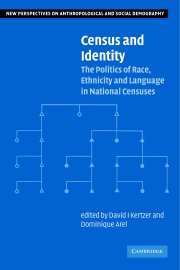Book contents
- Frontmatter
- Contents
- Contributors
- Preface
- 1 Censuses, identity formation, and the struggle for political power
- 2 Racial categorization and censuses
- 3 Ethnic categorizations in censuses: comparative observations from Israel, Canada, and the United States
- 4 Language categories in censuses: backward- or forward-looking?
- 5 Resistance to identity categorization in France
- 6 On counting, categorizing, and violence in Burundi and Rwanda
- 7 Identity counts: the Soviet legacy and the census in Uzbekistan
- Index
- References
4 - Language categories in censuses: backward- or forward-looking?
Published online by Cambridge University Press: 03 December 2009
- Frontmatter
- Contents
- Contributors
- Preface
- 1 Censuses, identity formation, and the struggle for political power
- 2 Racial categorization and censuses
- 3 Ethnic categorizations in censuses: comparative observations from Israel, Canada, and the United States
- 4 Language categories in censuses: backward- or forward-looking?
- 5 Resistance to identity categorization in France
- 6 On counting, categorizing, and violence in Burundi and Rwanda
- 7 Identity counts: the Soviet legacy and the census in Uzbekistan
- Index
- References
Summary
While the concept of the cultural nation cannot be reduced to a single marker of identity, language is often its most potent component. Most nationalist movements in the world view the language of their group as a key marker establishing the group's boundaries. There are well-known exceptions, of course, such as the Irish, who “lost” their language but not their religiously-defined identity, and the Serbs, Croats, and Bosnian Muslims, who shared a common standardized language in Yugoslavia. Moreover, one could cite endless examples of particular individuals who identify with a culturally defined nation without speaking the national language well, or conversely, who do not identify with the nation despite having learned its language as their native tongue.
The point, however, is about nationalist movements and how their discourse is shaped by nationalist elites. The Irish have survived the loss, for most practical purposes, of their language, but many nineteenth-century Irish nationalists did not think they would (Connor 1994, 105). The independent Croatian state is engaged in the re-standardization of Croatian, to make it evolve away from Serbian (Durkovic 1999). The Masurians, a minority of Eastern Prussia who spoke a dialectical variety of the Polish spoken in Warsaw staunchly clung to a Prussian/German identity, claiming that their mother tongue did not politically matter (Blanke 1999). This did not prevent Polish nationalists from claiming that the Masurians were theirs. The examples could be multiplied. In the politics of nationalism, language is almost always a point of contention.
Information
- Type
- Chapter
- Information
- Census and IdentityThe Politics of Race, Ethnicity, and Language in National Censuses, pp. 92 - 120Publisher: Cambridge University PressPrint publication year: 2001
References
Accessibility standard: Unknown
Why this information is here
This section outlines the accessibility features of this content - including support for screen readers, full keyboard navigation and high-contrast display options. This may not be relevant for you.Accessibility Information
- 23
- Cited by
